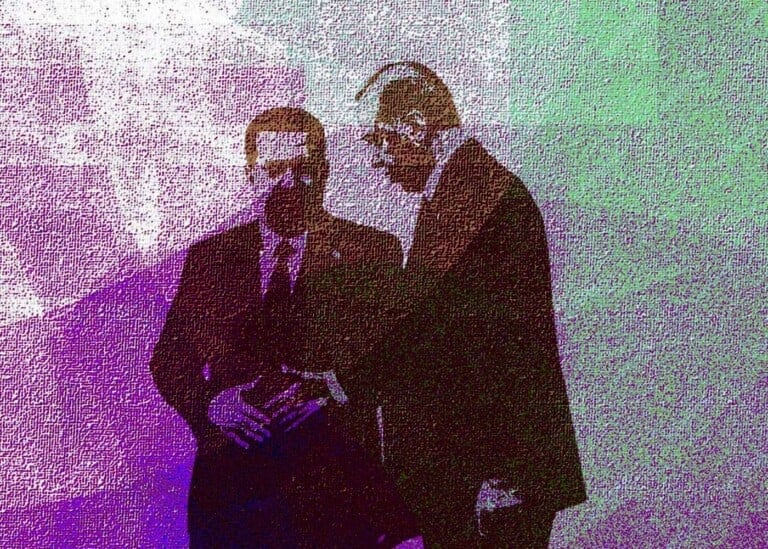It seems that the signing of 26 agreements and memoranda of understanding between Iraq and Turkey during the visit of Turkish President Recep Tayyip Erdogan to Baghdad has become difficult to implement on the ground, despite Ankara achieving its desired goal of the visit, namely banning the Kurdistan Workers’ Party and cooperating on development. An American report today pointed to “Iranian challenges” that may hinder these agreements, in addition to the nearing end of Prime Minister Mohammed Shia’ al-Sudani’s term.
Erdogan arrived in Baghdad on April 22nd in a visit that marks the first in 13 years, after his last visit as Prime Minister in March 2011.
According to a report from Voice of America, seen by “Al-Alam Al-Jadeed”, “The agreement between Erdogan and al-Sudani to expand bilateral relations will face a challenge from Iran, which has established significant political influence in Iraq.”
While the report noted the reaching of 26 agreements and memoranda of understanding as a “roadmap” for sustaining cooperation between Turkey and Iraq, Erdogan described it as a “turning point,” stating that it addressed key issues such as security, water management, trade, and the initial agreement between Ankara, Baghdad, Doha, and Abu Dhabi on the “Development Road” project, which is supposed to connect Gulf countries to Turkey and Europe through Iraq.
However, the report mentioned that “some experts doubt Turkey’s ability to expand its interests in Iraq, as they believe that Iran, as a regional competitor with greater influence in Iraq, ultimately contributes to defining Ankara’s relations with Baghdad.”
The report quoted Sardar Aziz, a researcher at the Emirates Policy Center and former advisor in the Kurdistan Regional Parliament, as saying, “It is doubtful that Iran would agree to become a member of NATO, competing with Tehran, the main player in Iraq.”
Aziz also pointed out that “the current Iraqi government’s term is nearing its end, which increases doubts for Turkey,” explaining that “Prime Minister al-Sudani has only one year left in office, and the chances of him staying in office are very low.”
The report quoted Aziz as saying, “In addition, no funds have been allocated in the Iraqi budget for these projects, which makes it impossible for these agreements to become long-term unless agreed upon by Iran.”
The American report stated that “while competition for influence between Turkey and Iran in Iraq is not new, Tehran has enjoyed greater influence since the US invasion in 2003,” adding that “the Popular Mobilization Forces have reinforced Iranian influence in Iraq since 2014.”
The report continued, “Experts believe that Turkey is trying to balance Iranian dominance by supporting the Sunni and Turkmen components in Iraq.”
The report stated that “Erdogan met with a group of representatives of the Turkmen component in Baghdad, following another meeting with representatives of the Sunni component.”
However, according to Iraqi writer Hassan al-Nasser, “Turkish influence over the Sunnis in Iraq may not be a helpful factor for Erdogan amid the significant divisions in the Sunni political base, especially after the dismissal of Parliament Speaker Mohammed al-Halbousi in November last year, which some Sunni leaders considered an attempt to marginalize the Sunni component in the country.”
The report quoted al-Nasser as saying, “Sunni political leaders are torn between Turkey, Saudi Arabia, Qatar, the UAE, and even Jordan, and there is no consensus among Iraqi Sunnis regarding the occupation of the Parliament Speaker position.”
Nazar Haider, director of the Iraqi Media Center based in Virginia, believes that “Turkey exploits sectarian divisions in Iraq as a negotiating card,” explaining that “the Iraqi public was shocked by images of Erdogan meeting with what he described as representatives of the Sunni and Turkmen communities,” adding, “This is a very dangerous issue.”
The report quoted Haider as saying, “The Sunni and Turkmen communities view Ankara as a supporting force in the Iraqi political process, and Ankara views the Sunni and Turkmen communities as negotiating cards with the Iraqi government.”
The report concluded that “Iranian involvement may complicate Iraq and Turkey’s attempts to cooperate in the security field,” recalling what Erdogan said on his return flight to Ankara, where he indicated that “Iraqi officials agreed to cooperate with his government against the Kurdistan Workers’ Party, and he wants to see tangible results from Baghdad’s classification of the party as a banned organization.”
According to Aziz, a researcher at the Emirates Policy Center, “It appears that Turkey has not achieved its goal of persuading Iraq to recognize the Kurdistan Workers’ Party as a terrorist organization.”
Sangar, as quoted in the report, said that “practically, assisting Iraq against the Kurdistan Workers’ Party is a difficult issue, as it has geopolitical and regional dimensions,” adding that “the expected Turkish military operations inside Iraq, especially in Sinjar, where the Kurdistan Workers’ Party and the Popular Mobilization Forces are active, could lead to direct involvement from Iran.”
On the other hand, Haider from the Iraqi Media Center in Virginia expects “no opposition from Iran to future Turkish military operations against Kurdish militants in Iraq,” explaining that Tehran “will agree to such an operation by Turkey because it provides Iran with a good opportunity to enhance its strategic interests within Iraqi territories, which is a beneficial scenario for both Iran and Turkey.”
Erdogan reiterated on April 23rd the necessity of strengthening relations with Iraq in all fields, considering today’s agreements with Iraq as a new page and a starting point for the future of both countries, while revealing the signing of an agreement with Iraq to classify the PKK as a terrorist organization for the purpose of combating it and eliminating it, according to him.





